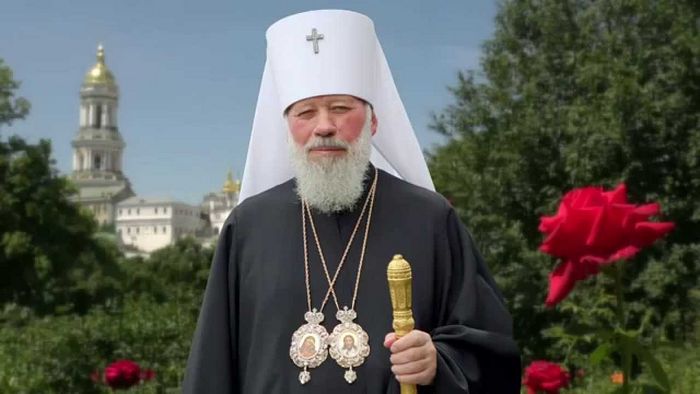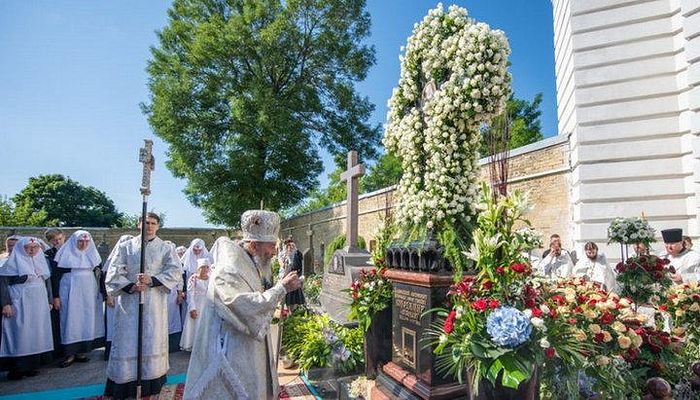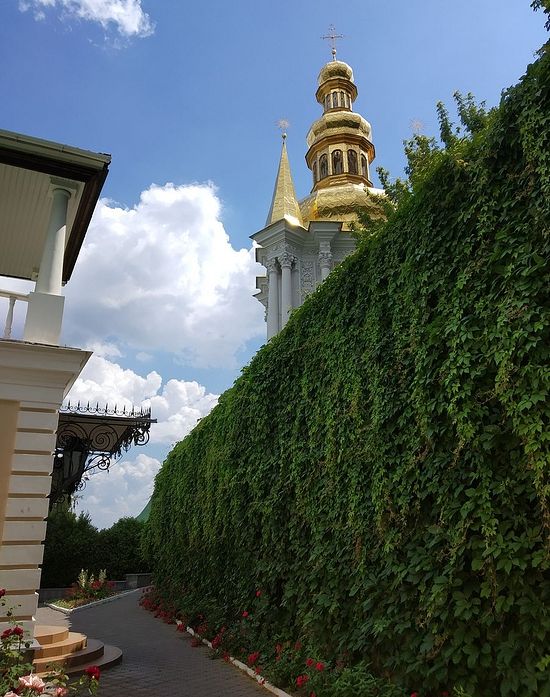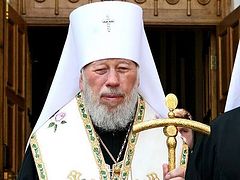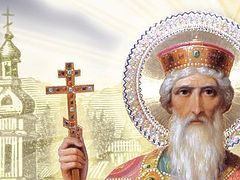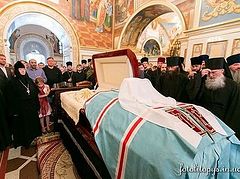The Ukrainian Orthodox Church celebrated the fifth-year anniversary of the repose of the Ever-Memorable and Most Blessed Metropolitan of Kiev and All Ukraine, His Beatitude Metropolitan Vladimir (Sabodan), on July 5, 2019.
His Beatitude was the previous Primate of the Ukrainian Orthodox Church, who reposed after a long period of infirmity around the time the Ukrainian crisis began in 2014.
On this anniversary of Metropolitan Vladimir’s repose, his successor Metropolitan Onuphry of Kiev and All Ukraine served a memorial liturgy and a panikhida at his grave, which is located just outside the home church of the Kiev Theological Seminary and Academy, which was reinvigorated during Metropolitan Vladimir’s the rule. A short video of the events can be seen here complete with a beautiful choir.
Serving together with His Beatitude were many clergymen, including Bishop Viktor (Kotsaba) the representative of the UOC to European international organizations, Bishop Dionisy of Pereiaslav-Khmelnytskyi, Archimandrite Dosifey (Mikhailyuk) the Dean of the Academy Church, other clergy of the academy church, and important guests.
In order to understand who Vladyka Vladimir was as a Primate, one first must naturally understand who he was as a human being, and to do that, one need only read the Ukrainian inscription on his grave, one of his most famous sayings: Ніколи нічого не просив, ні від чого не відмовлявся. Слава Богу за все! Which means: “I never asked for anything [from anyone] in this life, nor did I refuse anything. Glory to God for all things!”
Anyone who remembers that wonderful Christian saying can almost feel Vladyka’s presence, because it so perfectly described his character and personality. He never asked for anything, nor did he ever deny any hardship or misfortunes that fell upon him, nor refuse a person in need; but he accepted whatever happened to him in life, giving glory to God as long as he lived.
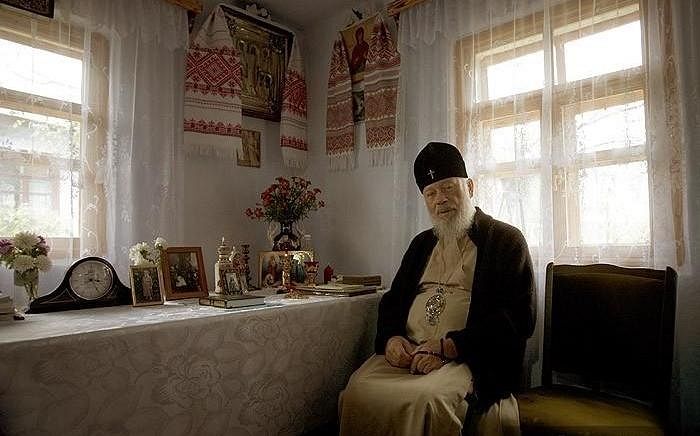 Metropolitan Vladimir in his native home. Photo: pravoslavie.ru
Metropolitan Vladimir in his native home. Photo: pravoslavie.ru
Vladyka more than anything understood what it meant to suffer, but never lost his sense of joy or the ability to convey joy to those around him. His constant prayer was that not a drop of blood be spilled in fratricidal conflict in Ukraine. He preferred that any suffering would fall on him personally, and not on Ukraine. He reposed in the Lord a few months after the War in Donbass began.
Metropolitan Vladimir ascended the throne as the 121st Metropolitan of Kiev at a very tumultuous time, right after the fall of the Soviet Union and the schism of Philaret. As one of the oldest hierarchs of the Russian Church, who reportedly refused to nominate himself as a candidate for the Patriarchal Throne[1], Metropolitan Vladimir led the Ukrainian Orthodox Church for all those many, often painful years, from 1992 until his repose in 2014.
Here is a collection of some of his quotes compiled by the Union of Orthodox Journalists:
Concerning the Icon of the Trinity:
“Andrei Rublev was 20 years old during the battle of Kulikovo Fields. With what strength did he have to suffer for his country, how greatly must he have loved it, to paint these angels so beautifully, as to beg heaven to send them to the earth, and in what lands is there such a masterpiece, as the Trinity Icon of Andrei Rublev?”
About the Church
“The Orthodox Church is the mystical Body of Christ, preserving the ancient church and dogmatic heritage which it contains to this day. And this heritage is not an unmoving monument, but it exudes a living and diverse force. The wisdom and love of God created the mysterious reality of the Church, in which the presence of Christ continues among us, bestowed on all people and giving them the fullness of salvation, life, and joy.”
Concerning faith
“You can believe in anything, but faith becomes a religion only when it is intertwined with its own way [and rules] of life, the evaluation of one’s actions, the wisdom of behavior, and a gaze directed towards the future.”
About unity
“Christ gave the commandment of universal love, but a commandment is only a law of religion. People are able to break all laws and commandments. Then Christ gave a more powerful means for people to feel unity. This is the unity within Himself, the universal brotherhood in Christ. There has never been, and never will be anything more universal than the unity of faith on earth.”
Concerning time
“It is not enough to simply do the right things, one must also recognize the right time in which they should be done. We cannot board a boat that has already sailed past, or one that has not yet arrived. To know how to act is only half the work, the other half is to know the right time in which to perform the action. There is a proper time for all things in the world, and all too often, people miss it.”
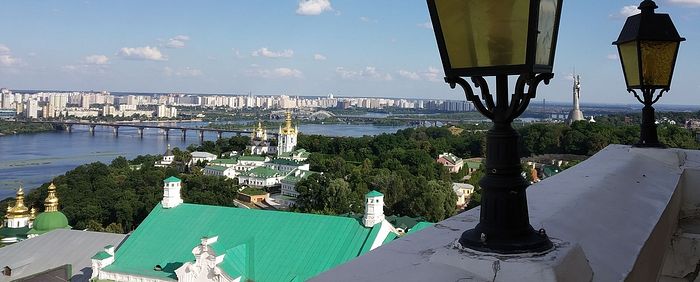 A view towards the academy church in the distance to the right of the river, taken from the Grand Lavra Belltower. Photo taken by Matfey Shaheen
A view towards the academy church in the distance to the right of the river, taken from the Grand Lavra Belltower. Photo taken by Matfey Shaheen
As noted, Vladika Vladimir is buried in the shadow of the Church of the Nativity of the Mother of God, underneath its beautiful bell tower, which is located on the southernmost part of the lower Lavra, up on a hill, nestled beside the walls. Those intimately familiar with Kiev Caves Lavra and the Kiev Theological Seminary and Academy, refer to this holy site simply as the “Academy Church”, and it is one of the most beautiful places in the Lavra, dominating the southward skyline.
The church manages to share both the opulence and ornate majesty of baroque architecture, without departing far from ancient Orthodox style, as European and Petrine baroque tend to do, and the interior is reminiscent of the cozy and warm style of Byzantine architecture and iconography.
Those features both describe the Academy Church itself, and the style in which it is built, “Ukrainian” or “Cossack Baroque”, which was the style championed by figures like Saint Petro Mohyla, Metropolitan of Kiev.
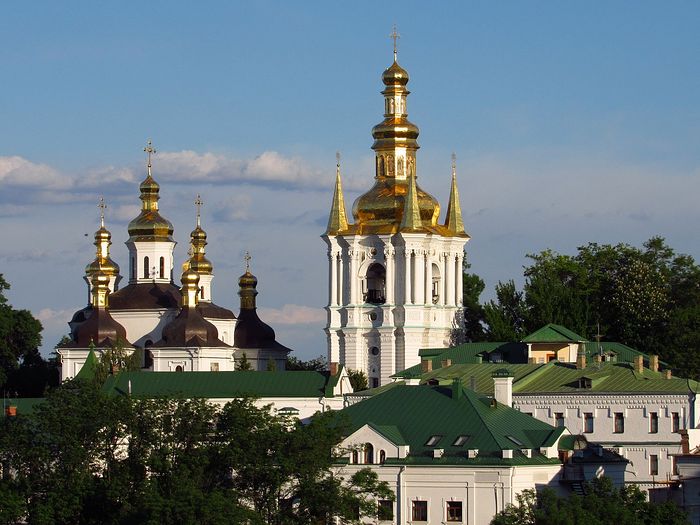 The bellower of the Academy Church is unique for its distinctive spires. Photo: Wikipedia
The bellower of the Academy Church is unique for its distinctive spires. Photo: Wikipedia
The Academy Church was recently restored to become the home church of the Kiev Seminary and Academy, and prior to its restoration, seminarians prayed in the Church of the Icon of the Mother of God “The Joy of all who are in sorrow”. The academy church is famous as both a very quiet and peaceful place to pray, being secluded on a hill near the far caves, surrounded by a wall and near gardens, and a place that offers one of the most beautiful views of the Lavra territory.
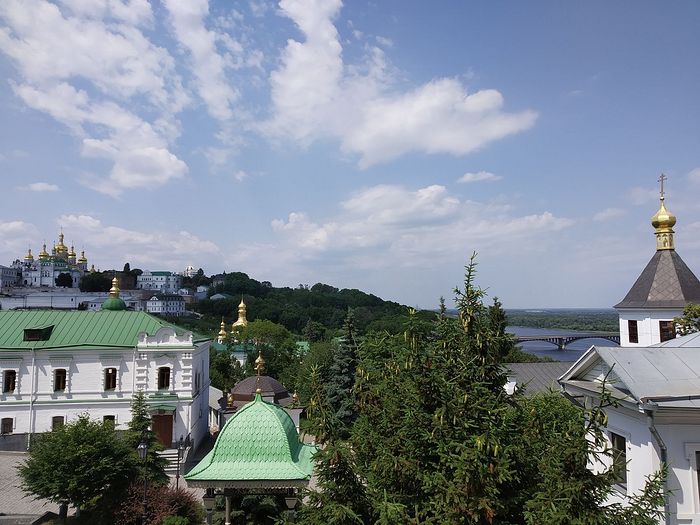 A view towards the upper lavra from the academy church, the great bell tower slightly out of sight. Photo: Matfey Shaheen
A view towards the upper lavra from the academy church, the great bell tower slightly out of sight. Photo: Matfey Shaheen
Beside the academy church, there is a cemetery with a view of the famous statue “The Motherland”.
The gardens nestled nearby, beside the walls in the direction of the Metropolitan’s Residence was a place where Vladyka could often be seen walking the Lavra grounds. He loved nature and walking throughout the Lavra, and never refused those who approached him.
It has now been five years after His Beatitude’s repose, and his church is not only strong, despite the persecution, but flowering. If you ever find yourself in the amazing Portion of the Mother of God, which is the Kiev Caves Lavra, take a walk down the beautiful path towards the Academy Church and say a prayer near the grave of Vladyka Vladimir.
May God grant Eternal Memory unto His Beatitude, Vladimir, the one hundred and twenty first Metropolitan of the God-Saved City of Kiev—the Baptismal Font of all Rus’.

